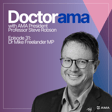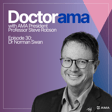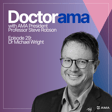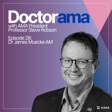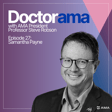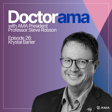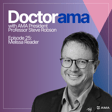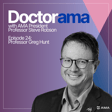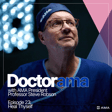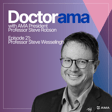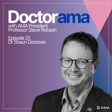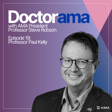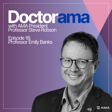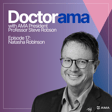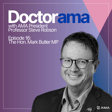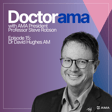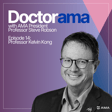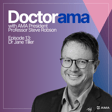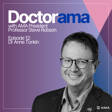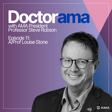Become a Creator today!Start creating today - Share your story with the world!
Start for free
00:00:00
00:00:01

Episode 20 - Dr Monique Ryan MP
In episode 20 of Doctorama AMA President Professor Steve Robson chats with Dr Monique Ryan MP.
Recommended
Transcript
Introduction with Steve Robson and Dr. Monique Ryan
00:00:00
Speaker
Imagine going from being one of the most well-recognised paediatric academics in the country to politics. What is that transition like? We're going to find out today on Dr Rama. You're listening to Dr Rama with Steve Robson, bringing you the best of health, medicine and people.
00:00:24
Speaker
I'm delighted to
Love for Melbourne and Cultural Comparisons
00:00:25
Speaker
say my guest today on Dr. Rama is Dr. Monique Ryan. Dr. Ryan, thanks so much for joining me. Thanks, Dave. Please call me Monique. Look, thank you very much. Monique, you are nothing if not an incredibly proud Melbourneian. What is it about Melbourne? You've grown up there, you've trained, but went away. You could really have worked anywhere looking at your CV. What is it about Melbourne that you like working in?
00:00:50
Speaker
It's a lovely city to live in, Steve. It's just the right size. I think it's equivalent in many ways to being in Boston where I trained for a period in that it's a sort of leftward leaning liberal city with a number of discreet seasons, a love of good coffee and some fantastic local sporting
00:01:17
Speaker
codes. I grew up supporting AFL. The older I get, the more attached I am to it. It's a great place to live. I lived in Sydney for some years as well, but quality of life in Melbourne is really wonderful. It's easy to live. I can't imagine anywhere else in the world where I'd rather be.
00:01:35
Speaker
Monique,
Passion for Carlton Football and Family Ties
00:01:36
Speaker
you've just upset all the Sydney signers listening to the podcast this afternoon. We may even need to think about editing that out, but we'll see how we go. Just for information, what team do you support? I'm a proud supporter of Carlton. I have a 15-year-old son who's experienced a life of disappointment. I've brought a lot of resilience in him, but this is the year, I think. We haven't won an apprenticeship since 95, but we're looking good.
00:02:03
Speaker
OK, I got my fingers crossed for you, Anik.
Medical Training in Boston and System Comparisons
00:02:06
Speaker
Look, you brought up Boston before and you did part of your training in Boston. What made you choose Boston? I know it's a big university town. And what were your experiences there moving over and working in the US and the US health system? Well, I trained in Melbourne. I went to Melbourne University and then started my pediatric training at the Royal Children's. I actually didn't get re-employed after my first year there, so I went to Sydney, spent some years there doing
00:02:33
Speaker
got the pediatric exams and then realised that I wanted to do neurology. In those days, Boston was the mecca for pediatric neurology. I had done a year in Sydney as a fellow at the Children's Hospital at Westmead and I'd had quite a bit to do with the
00:02:50
Speaker
both children's hospitals in Sydney to that point. And it was actually really quite fascinating because by the time I got there, I was reasonably experienced from a clinical point of view and it was a fantastic experience because I realized that much of the sort of cultural and academic cringe that we have in this country is completely unwarranted. I got to Boston and was
00:03:11
Speaker
actually surprised that the pediatric neurologists there, some of whom were brilliant, were no better or more brilliant than the people I've been working with in Sydney actually. And it was really, it was a fantastic experience because it gave me the confidence to understand. I think we sometimes sell ourselves short in Australia and we bow down to the UK and to the US in many ways, but in many instances that's not warranted. I had a great time there and I
00:03:37
Speaker
trained with some very, very smart people, got some great experience and was able to bring back some skills to Australia that weren't perhaps there at that point.
U.S. Hierarchy vs. Australian Inclusivity in Medicine
00:03:46
Speaker
But when I got there, I really was struck by the fact that academic medicine there was no better than in Australia, which was great to see.
00:03:53
Speaker
One of the things I've noticed, and I've spent a little bit of time, I'm actually a fellow of the American College of OMG, is there is greater inequity in the American health system than there is here. I mean, there's in fact enormous differences in the care available to different Americans. Did you have any observations of that or was it not so obvious in Boston?
00:04:16
Speaker
It wasn't quite so obvious in Boston and the Children's Hospital of Boston where I was based was kind of a quaternary referral centre. So it wasn't the same as working in one of the city hospitals where you would have been up against the poverty. But it was very, certainly was very, very different. And I was struck when I got there. I actually struggled a bit with the people that I was training with and the
00:04:40
Speaker
consultants in the department because I realised that our system in Australia was much more accepting and more inclusive and that as a trainee in Australia I was expected to encourage to have an opinion and to be able to defend it.
Pursuit of Academic Career and Evidence-Based Medicine
00:04:56
Speaker
The department I've been working with in Sydney was fairly robust and we had robust discussions which were respectful and really constructive but when I got to
00:05:05
Speaker
the states, I was kind of surprised by how incredibly hierarchical it was. And the first time I sort of said, oh, why did you do this? Why wouldn't you think of this? Would you consider that? That the look I received from my head of department reflected the fact that that sort of input was not welcome or it wasn't well received at all. It was very interesting to see a very different form of
00:05:31
Speaker
training, which was much more hierarchical and much less inclusive.
00:05:38
Speaker
Monique, you turn to Australia and like me, we've both been involved in the greasy poll that is academic medicine and you were a professor in Melbourne. What was it that made you lean toward academic medicine? You've got a long CV with a long research history. What I guess appealed to you and drew you in the direction of academia?
00:06:04
Speaker
Well, I guess I like things to be evidence based as much as possible. The area of medicine or the area of pediatric neurology that I'd gone into was nirvan muscle diseases. And when I started working in those areas, it was a bit like pediatric oncology in the sixties and seventies. You know, everyone died. There were no effective treatments for many of the conditions that I was specialising in. And most of our treatments were symptomatic.
00:06:32
Speaker
And it was just the dawn. It was a fantastic time to go into that area, really, because it was just the start of there being agents of interest in clinical trials into neuromuscular disorders of childhood. And to be a part of those and to get access to new therapies or potential new therapies as they were developed, I had to be running a clinical trial center. And so that's what I did in Sydney. And then when I moved back to Melbourne,
00:06:58
Speaker
I worked in clinical trials for neuromuscular disorders and started writing papers. I loved to write, actually, and I liked the fact that it wasn't just a clinical job. I liked having a bit more variation to the work that I was doing. I liked to be busy, so it gave me something to do out of hours, I guess.
Challenges in Pediatric Care and Parent Interactions
00:07:20
Speaker
Monique, something that always strikes me about pediatrics is, and correct me if I'm wrong, a lot of it is as much about the parents as it is about the children. And it must have been very difficult. As you said, some of the prognoses of the patients you're dealing with would have been very, very dire in a way.
00:07:43
Speaker
How did you feel, I mean, dealing as much with parents' anxieties as the children that you were treating? It certainly is something that puts many people off, paediatrics, I think, the fact that you have two sets of people with whom you have to deal. You have the children who are under your care, but then the parents who are caring for them. And it is challenging at times. I've always loved children. I've always gravitated to children. So paediatrics was a bit of a no-brainer. The challenge with dealing with parents is
00:08:13
Speaker
the extraordinary responsibility that you have with them. If you're working in oncology or neurology, very often you know that when you have a conversation with parents, you're about to give them possibly the worst news that they've ever heard in their life. That's a great responsibility, as is looking after children in the final phases of their life when you know that they have a disorder which is invariably fatal. Often you know that from diagnosis.
00:08:42
Speaker
Taking children and their parents through that process is an incredible privilege, I think, for a clinician. It's extraordinary. I still come across now, I've left clinical medicine more than two years ago now, but I often come across former patients or former parents, but the former parents of children who've died, you always have a relationship with them forever.
00:09:11
Speaker
It's so important that they remember how that has happened in a way that is not upsetting to them.
00:09:17
Speaker
with which they can find peace.
Managing a Public Hospital and Leadership Aspirations
00:09:19
Speaker
It was a really important part of the job. Yeah, I think that that is something that many, myself and a lot of our colleagues I suspect would struggle with quite a bit. Being a senior academic and running trial centres, as you did, is as much about an administrative burden and managing people as it is about managing research and managing
00:09:47
Speaker
How did you respond? How did you find that role, that management role that you always have as a senior academic and running a busy department? It is hard. I think it's the hardest part of most jobs is managing people. Of course, in public hospitals, you may be identified as a person to be head of the department, often because people think that you're a good doctor and you might have a good research record.
00:10:17
Speaker
You bring in a lot of research money. Yes, but you actually have no formal training in or potential particular skill in management of people. It is interesting that so many public hospitals are headed up by doctors with no real knowledge of how to do so. It's challenging. I found it really hard at times.
00:10:38
Speaker
I think being head of a public hospital department is one of the most difficult jobs that there is. It's a little bit like being in local government because you're sort of you've got enough standing that people expect you to do stuff, but not enough standing that you can actually do the things that they think that you should be able to achieve. It can be you are really between a rock and a hard place. And in fact, I found that that I was head of the Department of Neurology at the Royal Children's for about eight years and then during COVID.
00:11:05
Speaker
had a period of being acting head of medicine at the children's and it was then that I realised that I wanted to sort of try and move up rather than staying in the position where I was because I realised that when you got up a little bit further in the hierarchy of things, you could actually get stuff done. And that was then actually that I started to think, oh, I think my eight-year-old probably head of department for eight years is probably enough and trying to look for another challenge.
Involvement in Kathleen Folbig Case and Medical Evolution
00:11:30
Speaker
Monique, before I go to that transition you made and the new challenge that you took on, we talked earlier on about your providing or provision of some evidence in the Kathleen Folbig case, and I think a lot of people will understand how events played out in that case, and that Ms. Folbig was in jail for a long time.
00:11:58
Speaker
And we're talking about the new evidence around the co-modulin 2 mutation that came to light and played out over time. But just beyond the scientific and medical evidence that you were able to contribute to the case, there is a personal element to that. You're dealing with a mother who clearly had been through an unbelievable experience.
00:12:27
Speaker
How did you feel about the case in general, about the events, just a little bit beyond the evidence that you gave?
00:12:35
Speaker
So with that case, I did used to do some medical legal reports and usually have a bit of a lead into them, but I was actually contacted by Ms. Folbig's solicitor on a Thursday afternoon or something like that. And she asked me if I could give an opinion on the case and she needed it by the following Monday or Tuesday. And I sort of said, with that timeframe, probably not. But also what knowledge I had of the case, which was very vague,
00:13:02
Speaker
was an understanding that this was a woman who had been responsible for the murder of a number of children. And so I kind of had their response that if that were the case, then she should stay in jail for the rest of her life. And she said, the lawyer said, look, just have a look at the file. It's very small. Just have a look at the file and tell me what you think. And so I took it home. And I took it upstairs on a set day afternoon and had a look at it. It was really thin. It was sadly, it was sad how thin it was and how small it was and how many tests were done on that
00:13:32
Speaker
I only looked at the case of one of the kids. The tests that were done and the information that was there and the letters and the correspondence and all of it, I only took about an hour and a half to read. And I felt sick. I felt physically sick at the end of it because I remember walking downstairs to my husband saying,
00:13:53
Speaker
There's no smoking gun. I don't think she did it. And that was, I was sort of viscerally upset by that because I thought, what if she didn't do that? If she didn't inflict harm on that child, what about the others? And if she, you know, because it's like a bit of a house of cards and you start to think, well, if perhaps she's been subjected to the most extraordinary miscarriage of justice, which is a really difficult thing to get your head around and very, very distressing when you think about how that must have been.
00:14:24
Speaker
And so I didn't see the other three cases, I only saw one. And in fact, that child didn't have the carmodulin mutation, his course was quite different to the other kids. But I guess it was a really distressing one to be because it's so all or none, either she did or she didn't. And if she didn't, then what a dreadful, dreadful situation that she was in and how sad it was that things had
00:14:53
Speaker
played out in the way that they had. I couldn't imagine how difficult it must have been for her. But I also have sympathy for her former husband and for all the people involved. When you go back and look at the case histories, our knowledge of all of those conditions back then was so basic and our ability to understand them so limited.
Transition from Medicine to Politics Motivated by Climate Change
00:15:16
Speaker
I remember what it was like even when I started my own medical career, capacity to diagnose things and to treat them
00:15:23
Speaker
It just does not compare to where we are now and that the clinicians of today won't understand that. The extent to which things have changed in a generation are really quite extraordinary. And I would say thank you to the New South Wales Legal Service, which again and again and again was asked to review this case and so many people within the New South Wales government and legal departments
00:15:52
Speaker
I'm not even sure what it's called. The Director of Public Prosecutions and those sorts of things have been asked to relook at that case and review that case so many times. But in the end, what happened was it became legally really important because it really did create this question of to what extent can cases be reviewed on the basis of new medical evidence or potential new medical evidence, which is actually really important, legal,
00:16:17
Speaker
quite apart from the natural justice of this particular individual's situation.
00:16:23
Speaker
Yeah, absolutely. I mean, I had no involvement whatsoever except for reading the details. And the more that I read, the more literally distressed I got about the possibility of an incredible miscarriage of justice. So you being directly involved, I think I can understand why you would have had that reaction. Monique, you made a decision on an extraordinary transition in your
00:16:50
Speaker
career to run for the federal parliament. Tell me about your decision making, how your family reacted to your decision making, because it's a big, big thing to take on. It was a big thing to take on to run for federal parliament, but it was probably less of a big thing than people think because I didn't give myself any chance. So I had been increasingly frustrated with
00:17:19
Speaker
the liberal conservative forces, political forces in this country for some years. I've always been sort of left leaning in some ways in terms of social justice and things like that, but it's socially conservative. But I do think that as a doctor and a pediatrician, I think most people in that situation will have a
00:17:42
Speaker
certain affinity with social justice courses and the like. The main thing was climate change. And I had a son who was just reaching consciousness about the development of significance of anthropogenic climate change and becoming really distressed about it. And I felt very bad because I'm very close to him and I did not
00:18:02
Speaker
feel that I could reassure him that everything was going to be okay because I felt no certainty that that was the case. And so I really did feel that as the sort of person who gives money to good causes and supports environmental groups and all that sort of thing, that I was really not making any significance, any significant contribution whatsoever to addressing this thing, which I thought was
00:18:27
Speaker
the existential challenge of our generation. So that was the first thing. But the second thing was that this was a government that I was embarrassed by. And when they went to Glasgow for COP26, when they tried to represent us on the world stage in various ways, I found myself to be I didn't feel that they
00:18:48
Speaker
reflected the country in which I lived or certainly not the community in which I lived. And it just started to accumulate. So there was an ad in the paper one day, and I'd always flirted with the idea of running for public office in some way. But this ad said, are you the next independent candidate for Keong? And I thought, well, you know, someone has to do that. There had been an independent in 2019 and it done pretty well.
00:19:15
Speaker
And I thought, you know, someone needs to hold the government to account. So I thought, yep, someone needs to do it. And I'll put my hand up. I did not think that there was a realistic chance that I would be elected. I did have to give up quite a lot to run. And that is something actually that I and other people are sort of going to take on, I think, as a bit of an issue. You have to resign. If you're a public servant, you have to resign your position.
00:19:43
Speaker
never taken long service leave. I'd never taken any sort of any leave other than just normal leave in my time. So I gave up all the years and years of sick leave. Look, I'd worked in public hospital forever and to have to resign was actually a real problem for me. It's section 41 of the constitution and it's a problem for nurses, it's a problem for teachers, it's a problem for all of us who are
00:20:10
Speaker
public servants that you can't run for public office and you do have to actually walk away from that if you want to, but someone had to.
Life in Politics and Building Alliances
00:20:21
Speaker
I didn't actually think when I first put my hand up to do it that they would pick me. I thought that they
00:20:25
Speaker
local community group would find someone who was high profile, someone in the media or a sports person or someone like that. But once they did, it took off very quickly and it built in Patissic incredibly quickly in a way that was utterly unexpected. And six months later, I was elected, which I don't think anyone saw coming when they first started their independent movement in Keown.
00:20:55
Speaker
If you had to sort of, I guess, put your finger on a couple of key differences in the way your life is now, as compared to the way your life was before you were elected, what would you say the big differences in your life? Well, I have completely lost anonymity. Sounds ridiculous. But we had to work really hard in Qiong to get my face recognition up towards
00:21:23
Speaker
towards that of Josh Freundberg. And he was one of the most recognisable politicians in the country. So we worked incredibly hard to do that. And the byproduct of that is that I can't go to the supermarket without someone having a chat. I literally can't go for a run without
00:21:40
Speaker
people beeping at me. It's all self-inflicted. I've literally been approached in shops in the United States by people saying, I love what you're doing on climate. It's extraordinary. And I went from being just a normal person in the community and someone who had lots of friends and family in the community and well rooted within the community because I've lived here for a long time and friends in my family is very active in the suburbs in which we live.
00:22:10
Speaker
to being someone who literally, I mean, I was literally, I was driving home yesterday and some kids tooted at me and said, you know, get a result on Hex. It's really strange. And my family found it very hard to get to grips with and my kids still feel a bit uncomfortable about it, but you do get used to it. That's kind of the main thing. And the other thing is that I'm never, ever not
00:22:40
Speaker
I mean, I was always responsive to patients if they really needed me out of hours before it wasn't someone who ever turned the phone off. But you really have no idea every day what's going to happen or where you need to be or where you're going to have to go. The other transition, of course, is that you were the boss, you were the head of department, etc.
00:22:59
Speaker
The position you're in now is about alliance building and about building support for things. How did you find that transition from what you say goes to getting some people around you to support causes and legislative change and so on? Well, in the electorate, I've always had the people who helped me during the campaign and they've stayed on with me. And my team now is largely people who were involved in the last election campaign.
00:23:27
Speaker
It's a team of fabulous amateurs. None of us have been professional politicians before, and we've learned incredibly quickly. The one time I did try to take on a professional, it didn't actually work out very well. So I've realized that that's the way to go. People are incredibly generous with their knowledge. I think when they understand that I and the other independents are really dependent on experts, but we're really
00:23:53
Speaker
keen to get evidence base for the opinions or the decisions that we make. People are very generous because they know they can get a result with us and they know that hopefully we can amplify their voice and increasingly we can secure the results that they're after. So we've been very lucky. I think we've all worked very hard in learning who does what in each area. And I've learned that I can pick up the phone and call people who I would not have thought I could call and say, look, I'm so-and-so, can you please help me?
00:24:23
Speaker
almost always will because it's kind of mutually beneficial and because they know that I'm in a situation where I don't have the party apparatus behind me. But you do have to learn a lot and then you have to make relationships and work how to understand how to work with people in Parliament. And you can't do that overnight. You have to build up trust. And I'm very pragmatic. I don't really care which party people are from or, you know,
00:24:53
Speaker
The nice thing about not being a career politician and not being a party member is you don't have to worry about factions. You don't have to worry about this. We don't have to worry about that. You're just very results focused. And on day one, the prime minister said to us, none of us are here for as long as we think we're going to be. The average federal politician is there for less than two terms. So I'm very results focused.
Podcast Conclusion and Gratitude to Monique Ryan
00:25:12
Speaker
I'm trying to work out what are the things that matter most
00:25:15
Speaker
I've got some reasonable prospect of securing a result and how can we get onto that as quickly as possible. I've been very, very lucky with the people in my team who've helped me with that. Monique, you are undoubtedly extraordinarily busy. You have so many demands on your time and so many demands
00:25:34
Speaker
you personally. I want to thank you very much for giving up your time to speak to me on Dr. Rama. I'm sure we'll catch up around the traps as we have done before moving forward but it's been absolutely fantastic speaking with you and I wish you all the sort of I guess the sense of achievement moving forward which seems to be something that really drives you.
00:26:03
Speaker
Thank you, Steve. Appreciate it. It's been fun. Thank you. Thanks for listening to Dr Rama. You've been listening to Dr Rama, a podcast produced on Ngunnawal country by the Australian Medical Association. All rights reserved.
